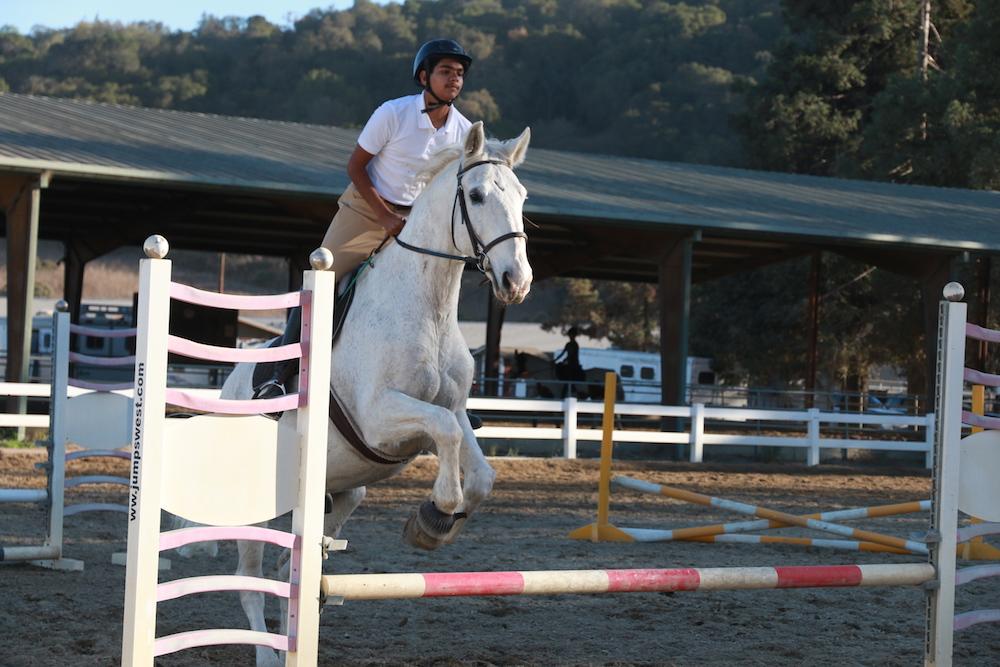Sophomore Rohin Ghosh steadies himself as he completes the final warmup loop before going on to the jumping course comprised of seven colorfully striped oxers — horse jumping obstacles with horizontal poles of varying heights. Plumes of dust kick up around his horse Bobby’s onyx hooves as the enormous animal canters toward the hurdle, powerful yet graceful.
Suddenly, responding to Ghosh’s carefully timed tug on the reigns, Bobby leaps over the obstacle with ease and recovers with two strides before bounding over an even taller jump.
With a grin on his face, Ghosh slows Bobby to a walk, both horse and rider cooling down after a successful ride.
Anyone who has witnessed an equestrian practice or competition can attest to the skill, dedication and intense training that the sport requires.
Ghosh is a minority in the arena: the only male in his riding group. All of other riders in Ghosh’s lesson as well as the coaches are female, making Ghosh a rarity in amateur horseback riding.
“I think the disciplines that I ride in — more amateur and mid-level — are definitely a lot more female dominated,” Ghosh says.
Saddle up
After just two horseback riding lessons in second grade, Ghosh was hooked. Short lessons led to summer camps that furthered his interest, which in turn led to regular lessons by fourth grade.
Like most novice riders, Ghosh started out riding in the Western tradition, an American style of riding associated with cattle work, and then transitioned to the more formal English style of jumping.
Ghosh has continued with one to two lessons per week at Webb Ranch, a family-run farm in Portola Valley established in 1922. To supplement these lessons, Ghosh participates in competitions at Webb Ranch every summer.
The life of an equestrian
While jumping events may be the most interesting for spectators, there are myriad other competitive events for riders in two categories: flat events and jumping events.
Flat events are judged for form going into a jump rather than the jump itself. These events are more stylistic in comparison to the jumping events.
The jumping events, which are typically more difficult than flat events, are more athletically focused and require great coordination.
Ghosh competes in flat courses and some lower-level jumping courses, but his favorite part of competing is spending time with his horse.
“Being able to have such an intimate connection with an animal is something that I enjoy about the sport,” Ghosh says.
Horses: a man’s best friend
According to Ghosh, riding with different horses is a unique experience and every pair has a varied dynamic.
Unfortunately, after riding with the horse he leased for the majority of the summer, the horse sustained an injury— a torn tendon in the knee — and was put on bedrest for the rest of the season.
After the injury, Ghosh was partnered with another horse to compete with in the annual stable competition.
“It was kind of hard because I practiced a lot with that horse,” Ghosh explained. “Every horse has their own different quirks and things that go on.”
Although Ghosh works with many different horses, he describes the intimate relationship between a horse and its rider as constant.
“If you are spending a lot of time with that horse, it’s a really close working relationship,” Ghosh says.
“It’s something that helps me relax and something that I really enjoy doing.”
— Rohin Ghosh, sophomore
Though from the rider’s position, the dynamic between a horse and his rider is equal and full of respect, Ghosh says that horses view the interaction differently.
“From the horse’s perspective, most of the time they see people as a leader — as more of a dominant-but-protective figure inside the herd,” Ghosh says.
This creates a very particular bond between horse and rider.
“Balancing the dynamic of the rider being the leader and setting strong boundaries and rules with being able to spend quality time with the horse is interesting,” Ghosh says.
Galloping into the future
Though Ghosh loves spending quality time with the animals, he does not see himself working with horses professionally after graduating. Nonetheless, he hopes to continue riding as a hobby for life.
“I think horseback riding is a great sport,” Ghosh says. “It has a really long tradition in a lot of cultures. It’s a really enduring sport.”
Even though he loves the sport, Ghosh admits that horseback riding is not for everybody.
“It definitely has its constraints: It’s time consuming [and] it’s expensive, but personally I find it’s a good sport for people who don’t like the physical, aggressive sports,” Ghosh explains.
In Ghosh’s opinion, horseback riding is an escape from the hassles of everyday life.
“For me it’s something that helps me relax and something that I really enjoy doing.”





